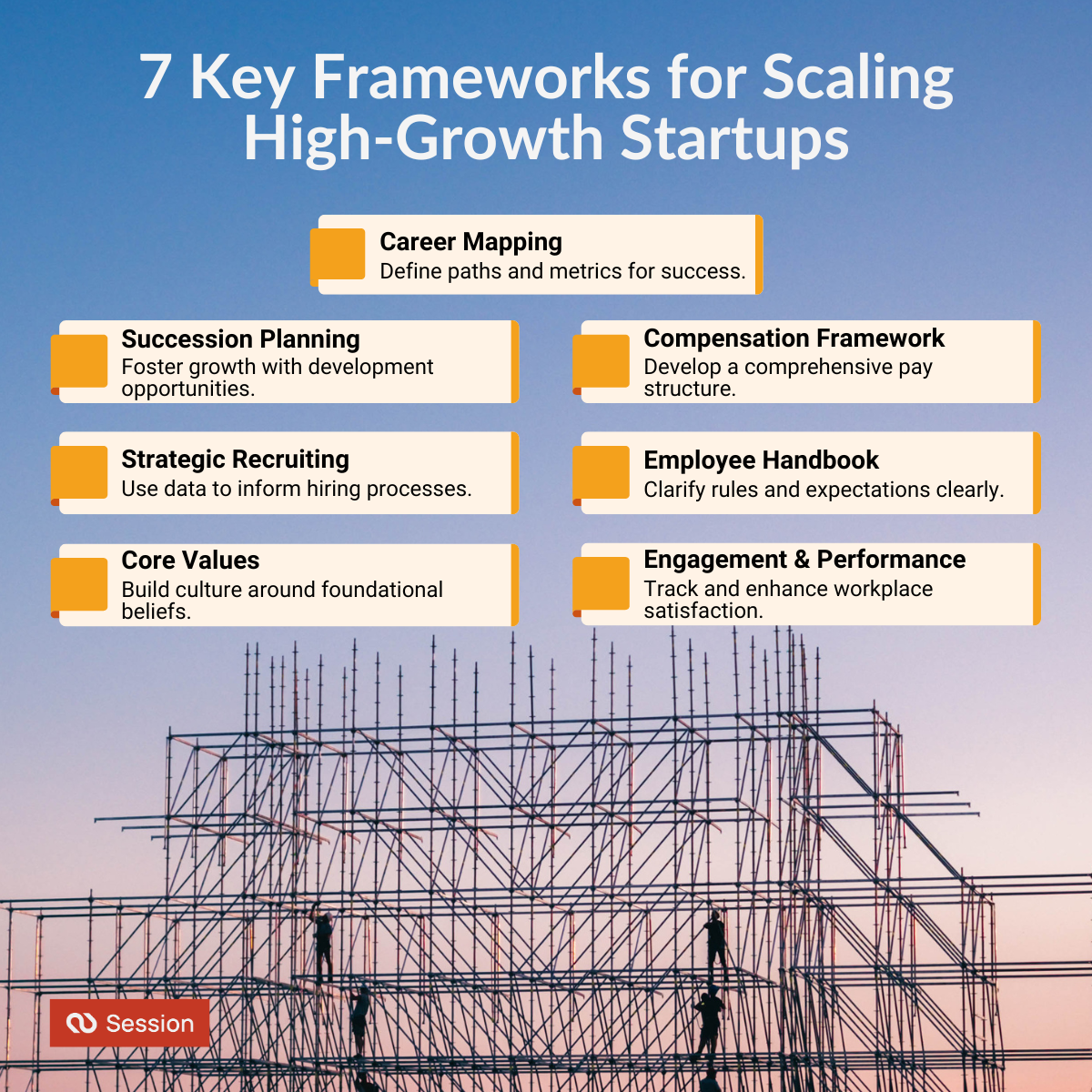Working in a high-growth environment? If so, you are most likely no stranger to chaos. With priorities, strategy, goals, and tasks changing at an accelerated pace, clear frameworks and structures need to be implemented to remedy the mayhem. From a leadership as well as an HR perspective, this is particularly crucial to retain employees and give teams a sense of security in the midst of constant change. Keep reading to find out more about the frameworks and structures which can secure a great culture, where you have employees thrive and perform despite ever-changing circumstances.

The Need for Frameworks and Measures Within the Startup Environment
Within the startup space, roles, projects, and tasks are subject to constant change. Although change is an inescapable part of any organization’s makeup, the rate and fluctuation of change in Startups is particularly fast-paced. That’s where clear prioritization and communication about those priorities come into play. Having regular meetings, allhands, team camps, huddles (whatever kinds of gatherings you have decided to have in your company to keep people informed and aligned) helps immensely to mitigate the fear, anxiety and uncertainty people might otherwise experience in the ever-changing Startup environment.
Besides implementing a good structure for and cadence of meetings/gatherings, you need to start thinking about what frameworks and measures you can use to not only hold people accountable, but also give them a sense of fairness and equality in terms of understanding how people are promoted and rewarded as well as a sense of what procedures and processes to follow in the company.
Within any high-growth company, a constant battle of figuring out what to prioritize generally takes place, and a kind of ‘’organized chaos’’ can become the norm. Therefore, if you don't build for instance the right hiring frameworks early on, trying to build anything else later on is going to be hard because you won’t have a set standard, or you don't have a framework or a mechanism for deciding on what to define as ‘’good’’ and a desired standard is in this realm. The same counts for any other area of your business. Therefore, implementing frameworks and measurements sooner rather than later in your Startup journey is an advice that cannot be underestimated, as it can become a great competitive advantage.
But where to start? Let's take a look at that.
Effective Frameworks To Implement Within the Startup Environment
Here are some frameworks and models that I have found incredibly helpful in my journey working as head of People and Culture in several fast-growing Startups:
1. Define what success looks like - and build clear career paths
Naturally, as an organization grows and people have been there longer, a question that people always ask is: ‘’What does my future look like here, how can I learn and grow and develop further in this company?’’ Therefore, building robust career development plans and career development ladders are crucial. Solidifying career development as part of a clear and equitable framework is critical. First, it helps each individual understand how they can get promoted and grow in the company. Secondly, in the case where you have a team of ten people and five of those people want to be promoted to management level, but only one manager role is available, having a clear framework in place ensures fairness. Sometimes career paths and promotions can be tangible, such as sales roles: there are very clear outputs, you can tell who's doing well, and who isn't doing well - and can promote individuals accordingly. Other roles are not so simple. Let’s take the example of software engineering: how do you determine who is ‘’good’’ and who is ‘’bad’’? There's technical competence and output and some markers such as code, but generally output is quite intangible. Determining fairness within rewards and promotion can be a tricky hurdle in any kind of Startup, because things change so fast. But you need to do your best to make your processes transparent and fair and have systems in place to track and measure accountability, so that people understand decisions.
2. Get started with succession planning - and offer development opportunities.
One thing I have noticed that most Startups are very slow with in terms of future-proving the company, is getting started with succession planning. This is not viable and puts the Startup at risk, should anything happen to the few people who at the beginning of the Startup Journey are the ones ``making it or breaking it” for the company. But think of succession planning as something that ensures antifragility for the company. You should early on start nurturing next level leadership, offer training and development opportunities and, as already mentioned, make it clear what is needed for people to take higher-level positions in the company.
Making it transparent what strategy you have and what opportunities you offer in terms of learning and development initiatives not only help you build up talent but will also help attract great people to work with you. It’s a win-win for you and the Startup!
3. Use a data-driven approach to hiring - be strategic when recruiting
One framework which can help you understand “if your best people really are your best people” is the Five Factor Model. By looking at the correlation between high performance and traits, you may discover a correlation between individuals scoring high on factors such as consciousness and openness - as we did in one of the companies where we took this approach. This allowed us to approach hiring from a Trait centric approach (using assessments such as the Big Five or the Ocean Model) as opposed to a ‘’Past Experience’’ approach. It broadened the hiring pool we could 'fish' from and completely changed how we perceived and hired for good talent.
Another factor when it comes to hiring and building the right frameworks for your recruitment strategy, is to take a close look at not only what talent you need right now, but also what will be needed to take the company to the next level. Take care, though, that you do in fact hire people who can help you at the stage your company is at, right now. You need people with a Startup / entrepreneurial mindset for as long as possible to help you scale your business. One common mistake might be to too early hire managers, who might have succeeded very well with scaling within a well-established large-corporation company structure, but who will also be hindering you in experimenting, pivoting, changing direction and working across boundaries (which is so much needed in a Startup) due to their positive experience with very well defined structures and procedures in a more bureaucratic setting. Do not offer the C-title too soon, either. Save these titles for a later stage, and focus on what needs to be done right now and make people deliver on that!
4. Define company values - build a great company culture
While it’s important to focus on company culture, the term culture can be a blanket term that gets thrown around, especially in the Startup world, where you see companies use it as a buzzword, without defining its meaning. Company culture is born out of underlying values. The values are the bedrock of your company, and you need them as guiding principles when you keep growing or adding or changing. Therefore, you need to define your core company values sooner rather than later - and you need the founders to be onboard and help define them. While some companies get a third party to help, or even have the HR department build out the values, founders are instrumental in defining the culture and the values. In fact, research has shown that 80% of a company’s culture is defined by it’s core leaders. So, it’s better to get the founders onboard in terms of making a deliberate effort to articulate which values will best help bring the company forward. Rather than letting this be an invisible side-effect of lived (and maybe not so wanted) behavior of the founder group and the first top-managers.
This does not mean that HR or an external consultant cannot help facilitate the process (in fact, they might be needed to get the best result), but the founders and top leadership need to be there to help articulate the values, including behavior connected to the values (do’s and don'ts).
An important thing to remember here is to have values that reflect the company, not the latest trends: Sometimes founders try to be ‘’in vogue’’ with their values and it doesn't really reflect the people that they are or the company as it is led, which leads to a huge mismatch. For example, if the founders are quite introverted and very shy by nature, but the company promotes a culture of partying and ping pong tables, there will be an inevitable clash. It's important to focus on who you are as a business, and what the founders stand for. Then the company can promote a culture which reflects those values and ensure that new hires are the right cultural fit for the company.
5. Build a compensation framework - make it clear how people get rewarded
Defining how people get paid and why they get paid that particular salary, is an important framework to establish right away. Salary is going to end up becoming a contentious issue for employees if they feel as if they are not being compensated fairly, or if an employee in the same position is making more money than them. Startups with large salary disparities create huge problems in the long run. Although Startups should not pay for expensive salary data, having a consistency model at the very least is a good starting point. Here are some principles I used to define a compensation framework:
- Align with market: If your compensations are aligned with market, then no one should be below market range (give them a raise before they quit), and no one should be above replacement cost (then they should be replaced). A good offer acceptance rate is in the 70-80% range—too low, and you might be underpaying, too high, and you might be overpaying. If you make a lot of offers, you should develop a pretty good understanding of the market from making offers and learning about what other companies are offering. There are also datasets such as Radford, which you have to pay for, and levels.fyi, which is a free database of self-reported salaries.
- Create consistency: A useful Litmus test to measure consistency is: if all salaries were made fully transparent, would people be upset? If so, you might have an inconsistency problem that needs to be addressed.
- Other types of compensation: There's of course many other things that constitute the total compensation, so let's also consider base salary, bonus, equity, and sign-on bonus.
6. Craft a well-written employee handbook - make rules, policies and expectations clear
Onboarding is an important part of the retention process, and how it’s approached will leave a lasting impression on employees. An employee handbook is a great communication tool in which you can tell people: this is what we believe in, this is how we operate, and here’s what to expect.
Many Startup founders postpone the work when it comes to writing a great employee handbook. They may look at this as unnecessary procrastination, taking precious time away from the “real work” of getting a product to market. How you take your product to market matters immensely, though. And this “How” is exactly what you describe in your handbook and why it is so important. On top of this, you help people save a lot of time trying to understand the unwritten rules, codes-of-conduct, and even the written rules of “how we do things around here” in the company. Therefore, do yourself a favor, and start pinning down the essentials early on.
7. Measure Engagement and Performance - and boost Happiness
Last, but not least, you need to instill measurements that can both show as well as boost engagement, performance and happiness.
In regards to engagement, you may use Gallup’s Q12 to measure it, do Pulse Survey’s or eNpS scores - or any other engagement tool on the market. Engagement scores give you a very important temperature of where people are in your company at the moment, and gives you an opportunity to instill initiatives heightening the engagement in your workforce. The importance of this cannot be underestimated. Engagement has proven - over and over - to be directly linked to performance, so it’s an easy place to start when it comes to boosting performance in the organization. Performance can, of course, also be measured on its own. You may track the sales numbers, the outreach success rates, the time-to-market, the earnings or any other indicators showing performance for individuals, teams or the business overall.
By instilling a culture of accountability in the organization, where it is clear to people what is expected of them, and where their progress is measured, rewarded and applauded, happiness is boosted. This is perhaps one of the most rewarding aspects of implementing meaningful frameworks and measurements on the Startup Journey. The frameworks and measurements give clarity, build trust, and yes - happiness.
Conclusion
I hope you have enjoyed reading this article and taken away some practical steps to implement within your organization. Frameworks and measures provide a remedy to high-growth chaos in ever-changing environments. Concentrate on solidifying the right frameworks for your organization and watch your people, your culture, and your business thrive.










